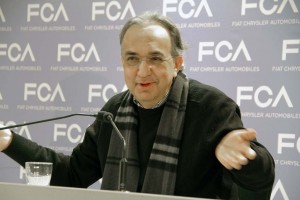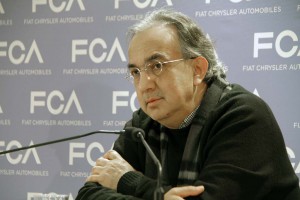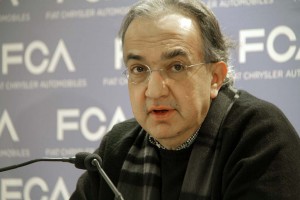
Would Fiat Chrysler consider opportunities to work with Apple or Google? "Obviously," said Marchionne.
Fiat Chrysler could seek to expand its list of outside alliances, CEO Sergio Marchionne said during a roundtable discussion at the Geneva Motor Show on Tuesday.
The maker is clearly pleased with the way things have gone in a partnership with Mazda. FCA worked with the Japanese maker on the upcoming Miata roadster replacement. And a second version will be sold through the Fiat brand as the reborn 124 Spider, Marchionne revealed.
“In the case of Mazda, they had something we didn’t have and we continue to look at opportunities like that going forward,” said the chief executive, adding that FCA is discussing other possible projects with Mazda while also looking for other potential partners.
Might the Euro-American automaker consider non-traditional ventures? Asked whether Fiat Chrysler might consider both Apple and Google, Marchionne quickly replied, “Obviously.”
(Live from Geneva. Click Here for complete coverage of the 2015 Geneva Motor Show.)
Google has made it clear it is looking for one or more partners that would be interested in bringing its cutting-edge autonomous vehicle technology to market. Meanwhile, widespread reports have suggested that Apple is working on its own self-driving system and could get into the car business, as well, whether with a partner or entirely on its own.

Europe's car market is finally recovering, but it will be a slow and uncertain rebound, warned Marchionne.
Recognizing that both companies “are incredibly serious,” Marchionne said that if they choose to get into the car business “they will.” But that is “exactly what this industry needs, a disruptive interloper” that can shake up the established status quo.
At the same time, Marchionne didn’t deny being “concerned about a well-funded interloper.” With a market capitalization of $753 billion, Apple is currently worth more than Toyota, General Motors, Ford, Volkswagen, Fiat Chrysler and several other leading automakers combined.
(VW aims to take the lead in automotive technology. Click Here to find out how.)
Like those traditional automotive manufacturers, FCA is putting more and more of a focus on advanced technology, whether in the form of infotainment systems or new powertrain tech. It is getting ready to launch its first plug-in hybrid, a version of its next-generation minivans, and Marchionne said that if it takes alternative propulsion systems to meet tighter new emissions and safety mandates, “We will comply.”
But he also stressed there is “still a lot” of potential to squeeze even more mileage out of the traditional combustion engine.

The industry needs "a disruptive interloper," said Marchionne, though he admitted being "concerned" by Apple's possible entry into the automotive business.
During his roundtable meeting, Marchionne was asked about the challenges his company faces in an increasingly globalized auto industry. Europe has been an especially big headache, primarily for the Fiat side of the company. Sales only late last year began to rebound after the worst downturn the market has experienced in decades.
“We’re seeing the beginning of recovery,” said the Canadian-educated exec. “I think it’s sustainable. But I don’t think it’s phenomenal.”
Despite a variety of “headwinds,” such as the crisis in Russia, Marchionne said he feels that FCA is holding closely to the plan it revealed out last May 6 when it laid out the specific direction each of its various brands will take.
The plan positions the long-straggling Alfa Romeo and Jeep as its two primary global brands. The Alfa revival is just getting underway, but Jeep is already off to a good start, setting a new sales record last year and aiming for major growth this year.
Europe has been a surprisingly receptive market for the SUV brand’s new Renegade model, and Marchionne predicted Jeep will soon be selling 3,000 of the compact utes weekly in the U.S., Canada and Mexico.
China is another potentially huge opportunity for Chrysler, and work to set up a new plant there is also “progressing as expected” after an unexpected series of delays negotiating a deal with Chinese regulators.
(Cold weather can’t stifle U.S. car sales in February. Click Here for the full story.)
